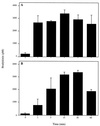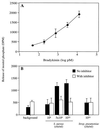Staphylococcus aureus induces release of bradykinin in human plasma
- PMID: 11349054
- PMCID: PMC98413
- DOI: 10.1128/IAI.69.6.3877-3882.2001
Staphylococcus aureus induces release of bradykinin in human plasma
Abstract
Staphylococcus aureus is a prominent human pathogen. Here we report that intact S. aureus bacteria activate the contact system in human plasma in vitro, resulting in a massive release of the potent proinflammatory and vasoactive peptide bradykinin. In contrast, no such effect was recorded with Streptococcus pneumoniae. In the activation of the contact system, blood coagulation factor XII and plasma kallikrein play central roles, and a specific inhibitor of these serine proteinases inhibited the release of bradykinin by S. aureus in human plasma. Furthermore, fragments of the cofactor H-kininogen of the contact system efficiently blocked bradykinin release. The results suggest that activation of the contact system at the surface of S. aureus and the subsequent release of bradykinin could contribute to the hypovolemic hypotension seen in patients with severe S. aureus sepsis. The data also suggest that the contact system could be used as a target in the treatment of S. aureus infections.
Figures






References
-
- Ben Nasr A, Olsen A, Sjöbring U, Muller-Esterl W, Björck L. Assembly of human contact phase proteins and release of bradykinin at the surface of curli-expressing Escherichia coli. Mol Microbiol. 1996;20:927–935. - PubMed
-
- Bone R C. How Gram-positive organisms cause sepsis. J Crit Care. 1993;8:51–59. - PubMed
Publication types
MeSH terms
Substances
LinkOut - more resources
Full Text Sources
Other Literature Sources
Medical

